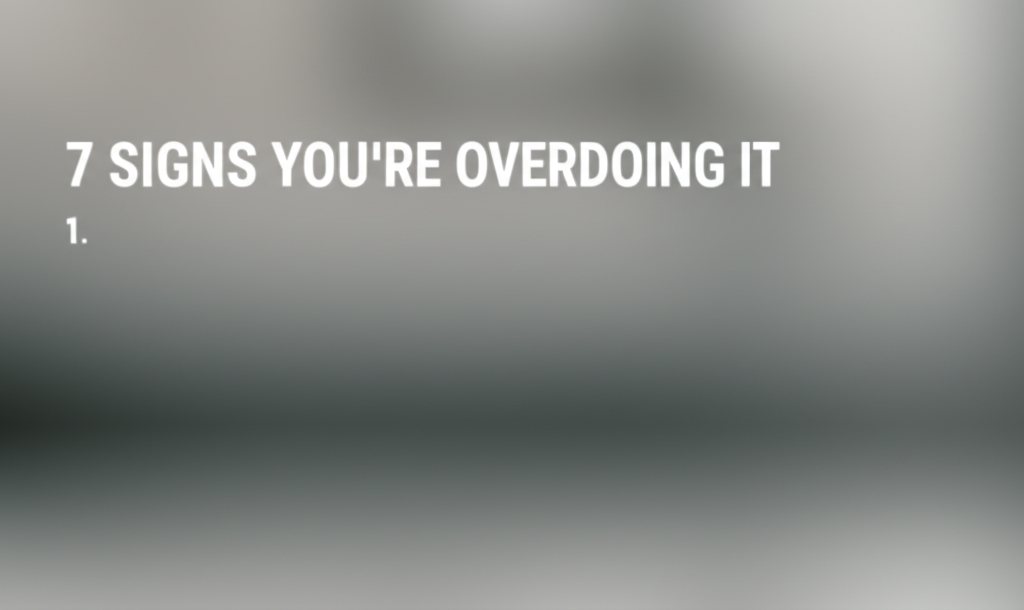Exercise is a cornerstone of a healthy lifestyle, offering numerous benefits for both physical and mental well-being. However, there’s a fine line between pushing your limits for progress and pushing yourself too far. When you consistently overtrain without adequate rest and recovery, you risk entering a state known as overtraining syndrome (OTS). This can not only hinder your progress but also lead to a host of negative physical and psychological consequences.
Recognizing the signs of overtraining is crucial for maintaining a sustainable and healthy fitness routine. Ignoring these warning signals can lead to burnout, injury, and a decline in overall health.

What is Overtraining Syndrome?
Overtraining syndrome is a complex condition that occurs when the intensity and volume of your workouts consistently exceed your body’s ability to recover. It’s more than just feeling a little tired or sore after a tough session; it’s a prolonged imbalance between stress and recovery that affects multiple body systems, including your neurological, endocrine, and immune systems. This imbalance can disrupt hormones, suppress the immune system, and negatively impact metabolism and muscle growth.
While common in competitive athletes, especially those training for specific events, overtraining can affect anyone who pushes their body too hard without sufficient rest.

Why is Overtraining Dangerous?
The “no pain, no gain” mentality can be detrimental if taken to an extreme. Constantly pushing past your limits without proper recovery can lead to serious health consequences. Overtraining can result in:
- Increased risk of injury: Your muscles, joints, and ligaments don’t get enough time to repair, leading to overuse injuries like stress fractures, tendonitis, and sprains.
- Weakened immune system: The stress on your body can suppress your immune system, making you more susceptible to infections and illnesses.
- Hormonal imbalances: Overtraining can disrupt hormones like cortisol (the stress hormone) and testosterone, affecting mood, muscle growth, and energy levels.
- Mental and emotional burnout: The constant physical and mental strain can lead to increased anxiety, depression, irritability, and a loss of motivation.
- Performance decline: Ironically, overtraining can lead to a plateau or even a decrease in athletic performance, despite increased effort.

7 Signs You’re Overdoing It
Here are key indicators that you might be exercising too much and need to incorporate more rest and recovery into your routine:
1. Persistent Fatigue and Lack of Energy
It’s normal to feel tired after a workout, but if you experience constant fatigue even after adequate rest, it’s a red flag for overtraining. This isn’t just physical tiredness; it can manifest as feeling excessively drained during or right after workouts, and a general sluggishness that doesn’t go away. Your body may be struggling to fully recover and replenish its energy stores.
2. Decline in Performance
One of the most telling signs of overtraining is a plateau or even a noticeable decrease in your workout performance, despite putting in more effort. You might find that workouts feel harder, you can’t maintain your usual intensity or speed, or your strength and endurance diminish. Your heart rate might also be higher during workouts and take longer to return to normal resting levels.
3. Chronic Muscle Soreness or Persistent Injuries
While some delayed onset muscle soreness (DOMS) is normal, persistent muscle soreness that lasts for days, or even worsens over time, is a sign that your muscles aren’t recovering properly. Overtraining also increases your susceptibility to recurring injuries, such as muscle sprains, tendinitis, joint pain, or stress fractures, because your body doesn’t have enough time to heal.
4. Disturbed Sleep Patterns
Despite feeling exhausted, overtraining can paradoxically lead to difficulty falling or staying asleep (insomnia), or experiencing restless, poor-quality sleep. This happens because an overstimulated nervous system and imbalanced stress hormones can make it hard for your body to relax and enter the restorative stages of sleep.
5. Mood Changes and Irritability
Overtraining can significantly impact your mental and emotional health. You might experience increased irritability, agitation, mood swings, anxiety, or even feelings of depression. This is often linked to hormonal imbalances, particularly elevated cortisol levels, which can affect emotional regulation.
6. Increased Incidence of Illnesses
If you find yourself frequently catching colds, experiencing prolonged recovery from minor illnesses, or generally feeling run down, your immune system might be compromised by overtraining. The constant stress placed on your body can suppress immune function, making you more vulnerable to infections.
7. Loss of Motivation or Enthusiasm for Exercise
What was once an enjoyable activity can become a chore. Overtraining can lead to a significant drop in motivation, a lack of enthusiasm for your workouts, or a feeling of dread about training. This mental and physical burnout can make you question your fitness goals and lose the joy you once found in exercise.

How to Prevent Overtraining
Preventing overtraining is about finding a sustainable balance between challenging your body and allowing it adequate time to recover.
- Prioritize Rest Days: Incorporate at least one to two complete rest days into your weekly schedule. These days are crucial for muscle repair and energy replenishment.
- Progress Gradually: Avoid sudden, drastic increases in training intensity, duration, or frequency. A good rule of thumb is to increase your training load by no more than 10% per week.
- Listen to Your Body: Pay close attention to how you feel. If something hurts beyond normal muscle soreness, or if you’re unusually fatigued, take a break or reduce intensity.
- Optimize Nutrition: Ensure you’re fueling your body adequately with enough calories, protein, and carbohydrates to support your training and recovery needs.
- Hydrate Properly: Stay well-hydrated before, during, and after workouts.
- Prioritize Sleep: Aim for 7-9 hours of quality sleep per night to allow your body to repair and restore itself.
- Incorporate Cross-Training and Active Recovery: Engage in different types of activities to work various muscle groups and allow others to rest. Light activities like yoga, stretching, or walking can aid recovery on “rest” days.
- Keep a Training Log: Track your workouts, performance, and how you feel mentally and physically. This can help you identify patterns and recognize early signs of overtraining.
- Manage Stress: Recognize that all stressors (exercise, work, personal life) contribute to your body’s overall load. Implement stress-reduction techniques like meditation or mindfulness.

When to Seek Professional Help
If you suspect you’re experiencing overtraining syndrome and symptoms persist despite incorporating more rest and recovery, it’s advisable to consult a healthcare professional, sports medicine physician, or physical therapist. They can help analyze your routine, assess your overall health, and provide personalized guidance for recovery. Recovery from OTS can take weeks to months, or even longer in severe cases, and may require a significant reduction or complete cessation of intense training. Mental health professionals can also provide support for the psychological effects of overtraining.







